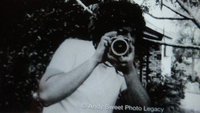
Andy Sweet
Actor
Andrew John Sweet (November 9, 1953 – October 17, 1982) was an American photographer known for his documentary photography and street photography. He photographed the life and residents of South Beach, with a particular focus on the Jewish community, many of them Holocaust survivors. Sweet also captured the carefree young people who made Miami Beach their second home. The Oxford American wrote a story on his vision of capturing a disappearing Jewish Community in Miami Beach. His violent death and the following trials were covered extensively in the media. The son of a prominent Miami Beach family, the gruesome nature of his death diverted attention from his art just when his work was gaining a following. By mischance, his negatives were lost, leaving only the prints he had made as his legacy, their colors slowly fading away. In 2006, Ellen Sweet Moss' partner Stan Hughes found a trove of color ‘work prints’ Sweet made prior to printing full-size prints, Hughes realized that digital technology could be used to restore the fading colors back to the original color that Andy Sweet intended by using color photography instead of the black and white photography that was popular during this era. The discovery of Sweet's test prints in a family storage unit has garnered new interest in his documentary photography. Some of his surviving prints have been restored over the last decade. A radio interview and print story by WLRN touched on the restoration process. A documentary on his life and photography will begin filming in early 2017. The Andy Sweet Photo Legacy Foundation, founded by his sister and artist Ellen Sweet Moss, is dedicated to increasing awareness of his photography and organizing exhibits of his work.
Andrew John Sweet (November 9, 1953 – October 17, 1982) was an American photographer known for his documentary photography and street photography. He photographed the life and residents of South Beach, with a particular focus on the Jewish community, many of them Holocaust survivors. Sweet also captured the carefree young people who made Miami Beach their second home. The Oxford American wrote a story on his vision of capturing a disappearing Jewish Community in Miami Beach.
His violent death and the following trials were covered extensively in the media. The son of a prominent Miami Beach family, the gruesome nature of his death diverted attention from his art just when his work was gaining a following. By mischance, his negatives were lost, leaving only the prints he had made as his legacy, their colors slowly fading away. In 2006, Ellen Sweet Moss' partner Stan Hughes found a trove of color ‘work prints’ Sweet made prior to printing full-size prints, Hughes realized that digital technology could be used to restore the fading colors back to the original color that Andy Sweet intended by using color photography instead of the black and white photography that was popular during this era.
The discovery of Sweet's test prints in a family storage unit has garnered new interest in his documentary photography. Some of his surviving prints have been restored over the last decade. A radio interview and print story by WLRN touched on the restoration process.
A documentary on his life and photography will begin filming in early 2017.
The Andy Sweet Photo Legacy Foundation, founded by his sister and artist Ellen Sweet Moss, is dedicated to increasing awareness of his photography and organizing exhibits of his work.
Andy Sweet Movies & TV Shows - Watch Online





